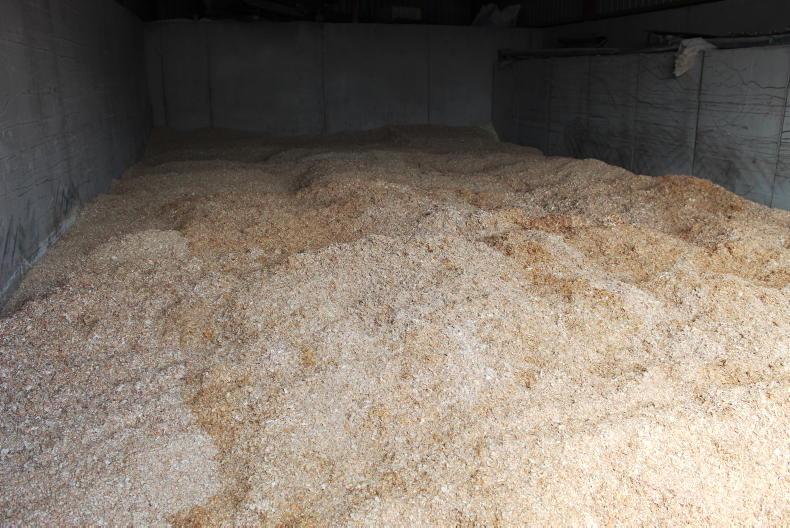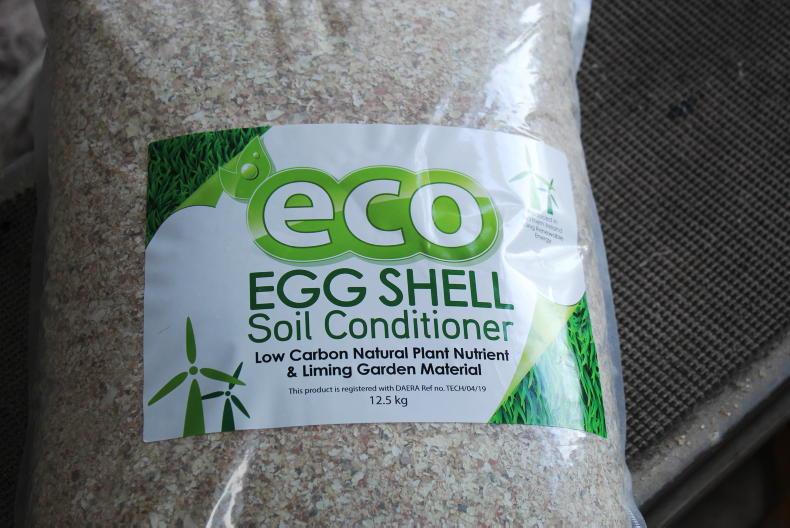There is an old saying in farming that if you look after the soil, it will look after you. Soil fertility, and in particular regular liming of soil, is something many farmers have neglected for years.
Crops and grass normally grow best when soils sit between pH 6.2 and 6.5. Below this level, soils start to become acidic, limiting the availability of soil nutrients.
When farmers do spread lime, in most cases a calcium-based limestone product will be used to raise pH levels to optimum target levels.
However, calcium limestone is generally sourced through mining and quarrying. With agriculture coming under growing scrutiny around sustainable farming practices, the industry will inevitably need a greener alternative source for lime.
New product
In Co Tyrone, dairy farmer Dessie McCarroll has developed an alternative to ground limestone. In late 2019, he stumbled upon waste eggshells as a potential source of calcium for liming soils.
While carrying out his research, he linked up with staff at the College of Agriculture, Food and Rural Enterprise (CAFRE).
Based on the laboratory results on the nutrient content, eggshell typically contained 93% to 95% calcium carbonate and is therefore a natural liming product.
In contrast, ground limestone commonly used on Irish farms for liming purposes typically has 35% to 40% calcium carbonate content.
But in order for it to be effective at neutralising soils, eggshell must be dried and milled to a fine powder before it can be applied. A waste disposal licence is also necessary in Northern Ireland.
Having obtained all mandatory licences from the governing regulatory authorities, Dessie started up his own company, Eco Egg Shell.
In the spring of 2020, he began selling milled eggshells to farmers on both sides of the Irish border, with business growing through word of mouth.
Background
Farming 75 acres at Eskra, Co Tyrone, Dessie milks 30 cows and runs a small suckler herd.
He has a background working within the trade side of the industry, as well as a previous role as an agri-consultant.
In 2016, Dessie purchased and installed a 250kW wind turbine on farm. However, as a grid connection was not available, all wind power produced from the turbine had to be utilised on farm.
As a result, Dessie opted to build a shed with vented drying floors. He began drying woodchip destined for various market outlets. It was through this work he got the idea of supplying eggshell for lime.
Process
Wet egg shells are delivered to Dessie’s yard, at which point they are spread on the floor of the drying shed.
Wind power is then used to dry the shells. This can take between 10 and 14 days depending on the depth of shells on the floor and wind speed.

Waste egg shells are dried on farm using green energy from a wind turbine. Dried shells are then milled using a Gehl hammer mill to reduce particle size.
The floor dries approximately 26t of wet shells at a time, removing around 4t of moisture. The dried shells are then milled to a fine consistency using a Gehl hammer mill.
Milled shells are then stored until required to fill orders. The final product is sold in 1t and 0.5t bags, which are also recycled and re-used from fertiliser companies and feed mills.

The drying floor can hold 26t of wet eggshells. The drying process is powered by an on-site turbine, removing 4t of moisture from the shells.
Application rates
Based on nutrient analysis, farmers using the products are advised to spread 150kg/acre on soils.
Although the shells are milled, they have a larger particle size than ground limestone.
However, a big positive of product is that it can be applied to grassland using a conventional fertiliser spreader.
This offers greater flexibility for farmers looking to lime isolated, or smaller fields without having to employ a specialist contractor.
Currently, each 500kg bulk bag sold costs the farmers £50 (€58), which means at the outlined spreading rate, bulk bags will cover just around 3.3 acres, or an application cost of £15/ac (€17.44).
Diversifying
Always looking for a way to diversify and expand market share, Dessie installed a small bagging machine last spring and is now selling eggshells into amenity horticultural suppliers and garden centres. The garden lime product is 95% calcium carbonate, 2.5% sulphur and 2.5% seaweed.
He has also supplied the product to local GAA clubs for pitch maintenance.
As with all aspects of the product, Dessie has recycled, upcycled and re-adapted other equipment within his manufacturing line.
Old grain and feed augers, along with the hopper bins from fertiliser sowers, were brought back to life and now used to dispatch eggshells to the bagging machine, again increasing the sustainability and green image of the product.
Pros and cons
Post spreading, grassland should not be grazed with livestock for a three-week period.
According to Dessie, Eco Egg Shell should only be applied when there is an actual requirement, based on the results of an up-to-date soil analysis.
While the calcium portion of the product is released slowly, research trials from Iowa State University showed that eggshell lime had a longer residual period in soils compared to ground limestone.
Future
With sales starting to grow, Dessie is planning to scale back his farming operations in order to focus on growing the Eco Egg Shell products within the agriculture and horticulture sectors.
Long-term supply is secured having signed a contract to handle waste eggshell from a major poultry processor.
Although it is a fledging product, Eco Egg Shell is just one example of how innovation can bring something to market that offers farmers a sustainable alternative to maintaining soil health and fertility.

Read more
Grain production on the increase
Five safety steps when dealing with stock bulls
There is an old saying in farming that if you look after the soil, it will look after you. Soil fertility, and in particular regular liming of soil, is something many farmers have neglected for years.
Crops and grass normally grow best when soils sit between pH 6.2 and 6.5. Below this level, soils start to become acidic, limiting the availability of soil nutrients.
When farmers do spread lime, in most cases a calcium-based limestone product will be used to raise pH levels to optimum target levels.
However, calcium limestone is generally sourced through mining and quarrying. With agriculture coming under growing scrutiny around sustainable farming practices, the industry will inevitably need a greener alternative source for lime.
New product
In Co Tyrone, dairy farmer Dessie McCarroll has developed an alternative to ground limestone. In late 2019, he stumbled upon waste eggshells as a potential source of calcium for liming soils.
While carrying out his research, he linked up with staff at the College of Agriculture, Food and Rural Enterprise (CAFRE).
Based on the laboratory results on the nutrient content, eggshell typically contained 93% to 95% calcium carbonate and is therefore a natural liming product.
In contrast, ground limestone commonly used on Irish farms for liming purposes typically has 35% to 40% calcium carbonate content.
But in order for it to be effective at neutralising soils, eggshell must be dried and milled to a fine powder before it can be applied. A waste disposal licence is also necessary in Northern Ireland.
Having obtained all mandatory licences from the governing regulatory authorities, Dessie started up his own company, Eco Egg Shell.
In the spring of 2020, he began selling milled eggshells to farmers on both sides of the Irish border, with business growing through word of mouth.
Background
Farming 75 acres at Eskra, Co Tyrone, Dessie milks 30 cows and runs a small suckler herd.
He has a background working within the trade side of the industry, as well as a previous role as an agri-consultant.
In 2016, Dessie purchased and installed a 250kW wind turbine on farm. However, as a grid connection was not available, all wind power produced from the turbine had to be utilised on farm.
As a result, Dessie opted to build a shed with vented drying floors. He began drying woodchip destined for various market outlets. It was through this work he got the idea of supplying eggshell for lime.
Process
Wet egg shells are delivered to Dessie’s yard, at which point they are spread on the floor of the drying shed.
Wind power is then used to dry the shells. This can take between 10 and 14 days depending on the depth of shells on the floor and wind speed.

Waste egg shells are dried on farm using green energy from a wind turbine. Dried shells are then milled using a Gehl hammer mill to reduce particle size.
The floor dries approximately 26t of wet shells at a time, removing around 4t of moisture. The dried shells are then milled to a fine consistency using a Gehl hammer mill.
Milled shells are then stored until required to fill orders. The final product is sold in 1t and 0.5t bags, which are also recycled and re-used from fertiliser companies and feed mills.

The drying floor can hold 26t of wet eggshells. The drying process is powered by an on-site turbine, removing 4t of moisture from the shells.
Application rates
Based on nutrient analysis, farmers using the products are advised to spread 150kg/acre on soils.
Although the shells are milled, they have a larger particle size than ground limestone.
However, a big positive of product is that it can be applied to grassland using a conventional fertiliser spreader.
This offers greater flexibility for farmers looking to lime isolated, or smaller fields without having to employ a specialist contractor.
Currently, each 500kg bulk bag sold costs the farmers £50 (€58), which means at the outlined spreading rate, bulk bags will cover just around 3.3 acres, or an application cost of £15/ac (€17.44).
Diversifying
Always looking for a way to diversify and expand market share, Dessie installed a small bagging machine last spring and is now selling eggshells into amenity horticultural suppliers and garden centres. The garden lime product is 95% calcium carbonate, 2.5% sulphur and 2.5% seaweed.
He has also supplied the product to local GAA clubs for pitch maintenance.
As with all aspects of the product, Dessie has recycled, upcycled and re-adapted other equipment within his manufacturing line.
Old grain and feed augers, along with the hopper bins from fertiliser sowers, were brought back to life and now used to dispatch eggshells to the bagging machine, again increasing the sustainability and green image of the product.
Pros and cons
Post spreading, grassland should not be grazed with livestock for a three-week period.
According to Dessie, Eco Egg Shell should only be applied when there is an actual requirement, based on the results of an up-to-date soil analysis.
While the calcium portion of the product is released slowly, research trials from Iowa State University showed that eggshell lime had a longer residual period in soils compared to ground limestone.
Future
With sales starting to grow, Dessie is planning to scale back his farming operations in order to focus on growing the Eco Egg Shell products within the agriculture and horticulture sectors.
Long-term supply is secured having signed a contract to handle waste eggshell from a major poultry processor.
Although it is a fledging product, Eco Egg Shell is just one example of how innovation can bring something to market that offers farmers a sustainable alternative to maintaining soil health and fertility.

Read more
Grain production on the increase
Five safety steps when dealing with stock bulls












SHARING OPTIONS